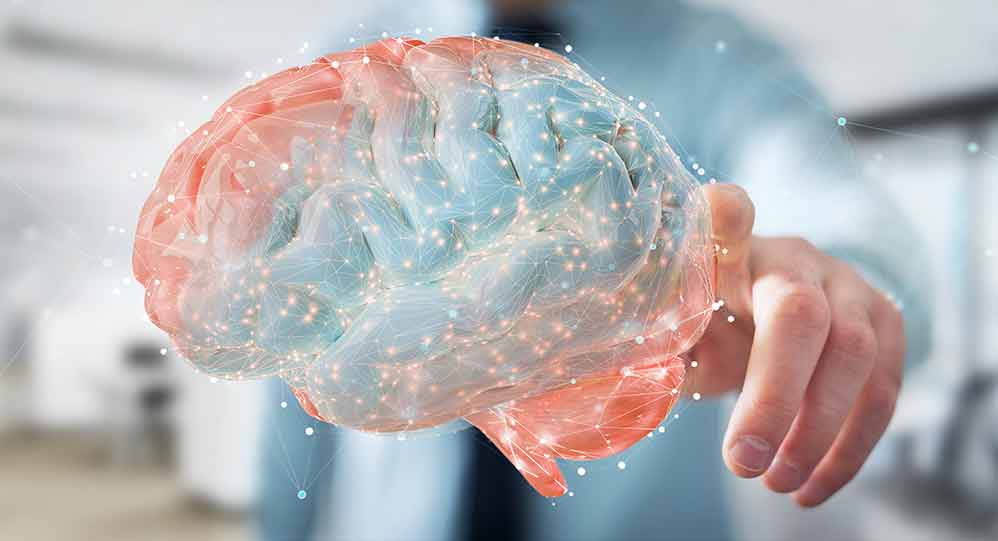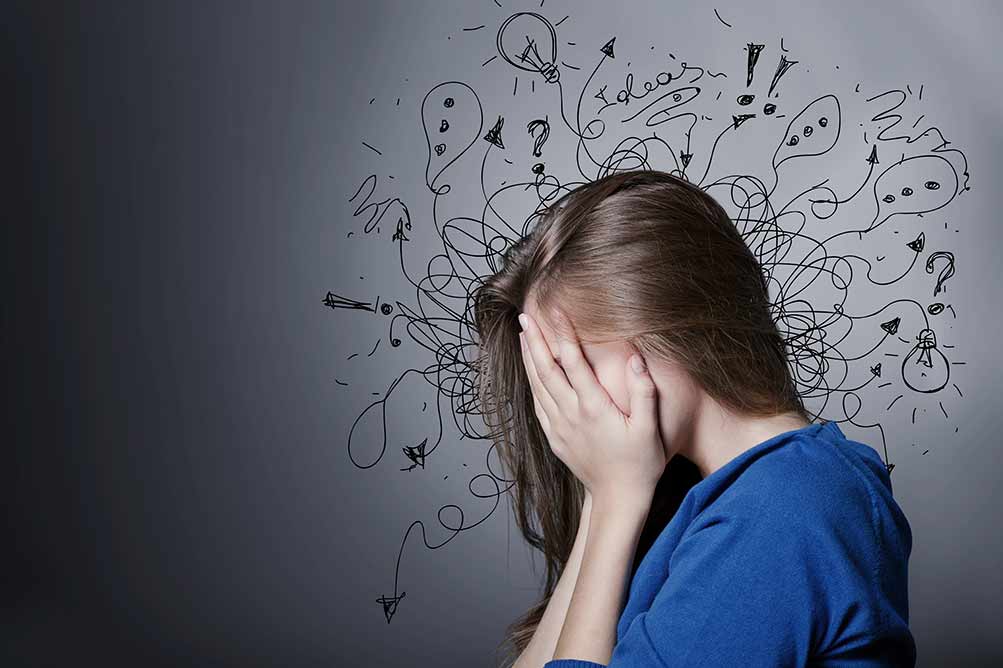The terms 'mental health' and 'behavioural health' refer to the cognitive, behavioural, and emotional well-being of people. It all comes down to how people think, feel, and act. The word 'mental health' is occasionally used to refer to the absence of a mental disease.
Mental illness can have a negative impact on daily life, relationships, and physical health.
This link, however, also works in the opposite direction. Mental health issues can be caused by a variety of reasons, including personal experiences, interpersonal relationships, and physical conditions.
Taking care of one's mental health can help one's ability to appreciate life. To do so, you must strike a balance between your daily activities, duties, and efforts to improve your psychological resilience.
Stress, despair, and anxiety can all have an impact on a person's mental health and disturb their daily routine.
Despite the widespread use of the phrase 'mental health,' many diseases that doctors classify as psychological disorders have physical underpinnings.

What Is Mental Health?
According to the World Health Organisation (WHO), 'Mental health is a state of well-being in which an individual realises his or her own abilities, can cope with the normal stresses of life, can work productively, and is able to make a contribution to his or her community.'
Mental health, according to WHO, is 'more than merely the absence of mental diseases or disabilities.' Peak mental health entails not only avoiding active mental illnesses but also maintaining overall well-being and happiness.
They also underline the need of protecting and repairing mental health on an individual level, as well as in many groups and societies around the world.

Characteristics Of A Mentally Healthy Person
Some characteristics of a mentally healthy person include:
1. They feel good about themselves: Because they accept themselves for who they are rather than living their life in response to what others think or feel about them. They recognise the importance of self-compassion in one's life and growth. What other people believe is unimportant to them.
2. They are not overwhelmed by negative emotions: Mentally healthy people recognise that they have little control over how they feel, but they can manage how they react to those sensations by focusing on their thoughts. They understand that trying to keep your emotions under control at all times is a losing battle.
When you are experiencing particular emotions, though, you should be cautious about what you do and say. This is entirely your responsibility.
3. They have lasting and satisfying personal relationships: You still need the company of others to feel and operate at your best, no matter how much time you commit to improving your mental and emotional health. Humans are social animals with emotional requirements for interactions and pleasant connections to others, according to mentally healthy people.
They recognise that we all require positive interactions and connections with others.
We weren't designed to live, much less prosper, in isolation. Even when our social brains have made us cautious and distrustful of others, we desire company.
4. They have respect for oneself and others: Mentally healthy people understand the importance of respecting themselves and others, even when they disagree.
They understand the importance of respect, which means accepting someone for who they are, even if they are different from you or you disagree with them.
Respect fosters a sense of trust, security, and well-being.
5. They make their own decisions: A mentally healthy individual recognises that they are ultimately in charge of their own lives.
They understand that every decision we make has an impact on our reality. Those choices, when added together over a lifetime, determine our ultimate fate. You can't let others make your decisions for you.
It's often the tiniest decisions that have the most impact on your life. Learn to make your own choices and accept the consequences.

Risk Factors
Everyone, regardless of age, sex, income, or race, is at risk of acquiring a mental health issue.
A person's mental health can be influenced by social and socioeconomic situations, biological variables, and lifestyle choices.
A high percentage of people who have a mental health illness have many conditions at the same time.
It's crucial to remember that good mental health is dependent on a delicate balance of factors, and that various aspects of life and the larger world can all contribute to mental illness.
The following variables could wreak havoc on your mental health.
1. Socio-Economic Pressure
Mental health disorders are more likely in people who have little financial resources or who belong to a marginalised or persecuted ethnic group.
Poverty and residing on the fringes of a large city were found as socio-economic drivers of mental health issues in a 2015 study of 903 Iranian families.
The researchers also discussed the disparity between the availability and quality of mental health therapy for different populations in terms of modifiable and non-modifiable factors, which might alter over time.
The following are modifiable factors for mental health disorders:
• a person's level of social activity and socioeconomic situations, such as whether work is available in the local region
• quality of education and housing
The following are non-modifiable factors:
• Gender
• Age
• Ethnicity
Gender is listed as both a controllable and non-modifiable component in the study. Female gender elevated the chance of poor mental health by 3.96 times, according to the researchers.
In this survey, people with a 'low economic standing' also scored the highest for mental health issues.
2. Biological Factors
According to the USA’s National Institute of Mental Health (NIMH), genetic family history can raise the incidence of mental health issues, as specific genes and gene variants put a person at risk.
Many other factors, however, have a role in the development of these illnesses.
Having a gene linked to a mental health disease, such as depression or schizophrenia, does not mean that you will acquire the disorder. People without associated genes or a family history of mental illness might also suffer from mental illness.
Stress, sadness, and anxiety are all mental health diseases that can emerge as a result of underlying, life-altering physical health issues including cancer, diabetes, and chronic pain.
Common Mental Health Disorders

1. Anxiety Disorders
Anxiety disorders are the most frequent type of mental illness, according to the Anxiety and Depression Association of America.
People who suffer from these disorders experience intense fear or anxiety in response to specific objects or situations. The majority of people who suffer from anxiety disorders will strive to avoid being exposed to whatever it is that makes them anxious.
Anxiety disorders include the following:
- Generalised Anxiety Disorder
Generalised Anxiety Disorder or GAD is defined by the American Psychiatric Association as excessive worry that interferes with daily life.
Physical symptoms, such as headaches, are also possible. Other symptoms include sleep disruption restlessness tiredness tense muscles
In patients with GAD, an episode of anxiety symptoms does not always require a specific trigger.
They may have extreme anxiety when confronted with mundane tasks that do not pose a direct threat, such as doing chores or making appointments. A person with GAD may experience anxiety without any apparent cause.
- Panic Disorders
Panic attacks, which include abrupt, overpowering anxiety or a sense of impending calamity and death, are common in people with panic disorder.
- Phobias
There are three types of phobias
• Simple Phobias: These could include an exaggerated dread of certain objects, scenarios, or animals. A common example is a fear of spiders.
• Social Phobias: This is a fear of being judged by others, which is also known as social anxiety. People who suffer from social phobia frequently limit their exposure to social situations.
• Agoraphobia: This word describes a dread of being trapped in a scenario where getting out is difficult, such as an elevator or a moving train. Many individuals mistake this phobia for a fear of the outdoors.
Phobias are quite personal, and doctors aren't familiar with all of them. There could be thousands of phobias, and what one person considers strange may be a serious condition that consumes their everyday lives for another.
- Obsessive Compulsive Disorder (OCD)
Obsessions and compulsions are common among people with OCD. In other words, they have a strong need to conduct repetitive actions, such as hand washing, and they have persistent, anxious thoughts.
- Post-Traumatic Stress Disorder
After experiencing or witnessing a highly stressful or traumatic event, PTSD can develop.
The person believes that theirs or other people's lives are in jeopardy during this type of incident. They may be scared or believe they have no control over what is going on.
Trauma and fear experiences may then contribute to PTSD.

2. Mood Disorders
Mood disorders are sometimes known as affective disorders or depressive disorders.
People with these diseases experience major variations in mood, with mania (a period of high energy and elation) or depression (a period of low energy and elation) being the most common. Mood disorders include the following:
• Major Depression: A person suffering from serious depression is constantly depressed and loses interest in things and events that they formerly enjoyed. They can be unhappy for lengthy periods of time or be extremely sad.
• Bipolar Disorder: Bipolar disorder causes extraordinary fluctuations in a person's mood, energy level, degree of activity, and capacity to carry on with daily activities. Manic phases are characterised by high mood, whilst depressed phases are characterised by low mood.
• Seasonal Affective Disorder (SAD): This type of serious depression is triggered by reduced daylight stimuli in the fall, winter, and early spring months. It's most common in countries that aren't close to the equator.

3. Schizophrenia
Authorities in the field of mental health are still debating whether schizophrenia is a single sickness or a collection of illnesses. It's a complicated situation.
Schizophrenia symptoms usually appear between the ages of 16 and 30.
According to NIMH, the person's ideas will appear fragmented, and they may find it difficult to assimilate information.
Schizophrenia manifests itself in both bad and good ways. Delusions, thinking disorders, and hallucinations are all positive indications. Withdrawal, a lack of motivation, and a flat or unsuitable mood are all negative effects.

Treatment
There are several approaches to dealing with mental health issues. Treatment is often personalised, and what works for one person may not work for the next.
Some techniques or treatments work better when used in tandem with others. At different points in their lives, a person with a persistent mental illness might choose from a variety of options.
The person must work closely with a doctor who can assist them in identifying their requirements and providing appropriate treatment.
The following are some examples of treatments:
1. Therapy
This method of treatment approaches mental illness from a psychological standpoint. Examples include cognitive behavioural therapy, exposure treatment, and dialectical behaviour therapy.
This sort of treatment is provided by psychiatrists, psychologists, psychotherapists, and some primary care providers.
It can assist patients in recognising the source of their mental illness and beginning to develop more healthy thought patterns that support daily living while reducing the danger of isolation and self-harm.
2. Medication
Anti-depressants, antipsychotics, and anxiolytics are among the medications administered to some persons.
While these medications cannot cure mental diseases, they can help a person improve their symptoms and resume social contact and a normal schedule while they work on their mental health.
Some of these drugs act by increasing the body's absorption of feel-good chemicals from the brain, such as serotonin. Other medications either increase the total levels of these compounds or stop them from degrading or being destroyed.
3. Self-Help
A person dealing with mental health issues will almost always need to make lifestyle modifications in order to be well.
Reducing alcohol consumption, sleeping more, and eating a well-balanced, healthy diet are examples of such adjustments. People may need to take time from work or handle personal relationship issues that are negatively impacting their mental health.
Relaxation techniques such as deep breathing, meditation, and mindfulness may be beneficial to people suffering from anxiety or depression.
Having a support network, whether through self-help groups or close friends and family, is extremely important for mental illness rehabilitation.
In Conclusion
Mental health is a very important aspect of our lives. You can always learn your triggers and keep improving your mental health. In recent times, thanks to the help easily available at hand, people are able to take cognisance of their mental well-being and make the quality of their lives better.
FAQs
Q. What is meant by mental health?
A. According to the World Health Organisation (WHO), 'Mental health is a state of well-being in which an individual realises his or her own abilities, can cope with the normal stresses of life, can work productively, and is able to make a contribution to his or her community.'
Q. How can you improve your mental health?
A. There are various treatment options available, which you can opt for based on your preference and its efficiency levels. However, it must be noted that treatment is often personalised and can be different for person to person.